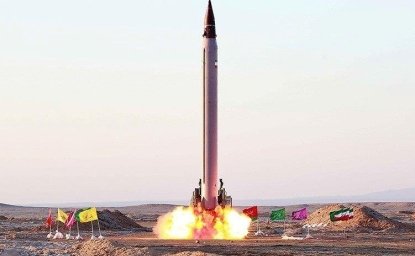By Peter Bean
Combating the proliferation of weapons of mass destruction (WMD) is one of the primary objectives of U.S. foreign policy. From hostile states such as Iran and North Korea to terrorist groups like Al Qaeda, U.S. officials are grappling with the challenge of developing effective strategies to assure that WMD do not fall into unfriendly hands. Robert Litwak, director of the Division of International Studies at the Woodrow Wilson Center and a former National Security Council staff member, has focused his research on developing strategies to address the proliferation threat from "rogue states," as well as the broader issue of reintegrating these countries into international society.
"I think what the Wilson Center does best through its public programs and research," Litwak observes, "is to provide context for current policy debates. That's the motivation behind my work here. I think that this context-—whether it be the often neglected historical and cultural dimensions of current issues, or the rigorous analysis of underlying, and frequently unstated, assumptions-—can inform, and hopefully improve, the policy-making process."
Litwak's current project is a continuation of the research published in his book, Rogue States and U.S. Foreign Policy: Containment After the Cold War (Woodrow Wilson Center Press and Johns Hopkins University Press, 2000). In that study, Litwak challenged the very concept of "rogue states," arguing that it was an inadequate formulation for dealing with a diverse set of states. Each case presents its unique circumstances and therefore requires a tailored strategy that employs the appropriate mix of policy instruments, which range from diplomacy and economic sanctions to the use of force.
The Clinton administration found the "rogue state" term useful for mobilizing political support for hard-line policies toward those various countries it designated as rogue states. But over time, the administration found that the rogue state category, while politically convenient, was problematic. "Because the term ‘rogue state' has no standing in international law and is quintessentially political," Litwak notes, "its application was selective and contradictory—-for example, including Cuba, which had no WMD capabilities, while excluding Syria, which had WMD but was needed for the Middle East peace process." Because the term limited its flexibility to pragmatically engage "rogue states," when appropriate, the Clinton administration eventually dropped it from official use.
The succeeding Bush administration revived the term and warned of the threat posed by "rogue states intent on developing weapons of mass destruction." Like its predecessor, the Bush administration found the term useful for building public support for its policies, particularly with its plan to accelerate the development of a ballistic-missile defense program to deal with the rogue state threat. "But as in the Clinton era, the pragmatic need to engage rogues, such as North Korea, while characterizing them as essentially crazy states beyond the pale, has created a policy tension."
The September 11th terrorist attacks prompted the Bush administration to enunciate a new doctrine of military preemption in its 2002 National Security Strategy document-—a move that triggered considerable controversy. Both domestic and international critics alike feared the new policy would undermine established international norms governing the use of force. Administration officials have since tried to allay that concern by insisting that preemption has always been an element of U.S. strategy and would continue to be a last resort. The Iraq war was subsequently waged without the legitimizing imprimatur of the UN Security Council in what some claimed was a paradigmatic application of the Bush administration's new preemption doctrine.
Taking the work of UN inspectors in the 1990s together with recent U.S. actions to destroy the bases for revived WMD programs, Iraq stands as the first case of coerced WMD disarmament. A major question to emerge from that conflict is whether regime change itself can lead to durable nonproliferation. This is especially relevant as policymakers try to find the best approach for dealing with North Korea (which claims already to have nuclear weapons) and Iran (where a civilian nuclear energy program is believed to cloak a clandestine weapons program). Litwak's research, recently published by the International Institute for Strategic Studies, supports the conclusion that "regime intention," rather than regime type, is the critical proliferation indicator. Proliferation aspirations derive not from the particular political character of the regime in power (whether democratic or authoritarian) but instead from a combination of factors that are not necessarily regime-type specific, such as national prestige, civil-military relations, leadership psychology, and state and regional security. "Those eight states that have ‘gone nuclear' vary widely, both in their types of domestic political orders and in their regional security environments," Litwak notes. "Their decisions, as well as those by states forgoing the nuclear option, have been highly context-dependent."
The term "regime change" is commonly viewed as a "sharp split between old and new." Historically, Litwak observes, total regime change "that not only removes the regime leadership but transforms governmental institutions" is rare. "Instead, for policy analysis, the term should be viewed as embodying a dynamic process that occurs along a continuum of change."
Even if total regime change does occur, other motivations, not specific to the regime, must be addressed if durable nonproliferation is to be achieved. For example, the acquisition of nuclear weapons by Iran could create an incentive for even a post-Saddam Iraqi regime to follow suit. Because the motivations for proliferation are usually not regime-specific, a successful U.S. nonproliferation strategy requires a multi-tiered approach that includes traditional instruments of proliferation restraint, such as security guarantees, efforts to maintain regional stability, and international agreements (notably, the Non-Proliferation Treaty).
Litwak also notes the policy tension for U.S. officials arising from the near-term imperative of addressing North Korea and Iran's nuclear weapons, while aspiring for a long-term change in their ruling regimes. "In dealing with an imminent proliferation threat," Litwak says, "policymakers cannot wait for a long-term political process to play out. In a context where preemption is not an option, such waiting is the functional equivalent of acquiescing to proliferation."
In the current crises with North Korea and Iran, Litwak observes, the significant constraints on the use of preemptive force and on the ability of the United States to bring about regime change in either country is leading to a significant shift toward a strategy of "deterrence and reassurance." The regimes should be presented with "a stark choice between the tangible benefits of behavior change and the penalties for non-compliance." For the strategy to succeed, however, the United States must also credibly reassure the target state that it will not pursue a regime change strategy if there is indeed a change in the regime's objectionable behavior. If the regime believes that a regime-changing military strike is unavoidable, even if it does change behavior, there is no incentive for it to cooperate. Litwak likens the strategy to "poisoned carrots": in return for behavioral changes, a regime is offered assurances of non-aggression from the United States and terms of engagement with the outside world that may very well undermine its stranglehold on power. "The challenge for the Bush administration is whether its regime change rhetoric and policies-—the ‘axis of evil' speech and the preemption doctrine-—have priced it out of the reassurance market with North Korea and Iran."
Robert S. Litwak is Director of the Division of International Studies at the Woodrow Wilson International Center for Scholars in Washington, D.C. He is the author of Rogue States and U.S. Foreign Policy (Woodrow Wilson Center Press and Johns Hopkins University Press, 2000) and served as Director for Nonproliferation and Export Controls on the National Security Council staff during the first Clinton administration. He is currently writing a sequel to his 2000 book that extends that analysis through the post-9/11 period.
Related Links


